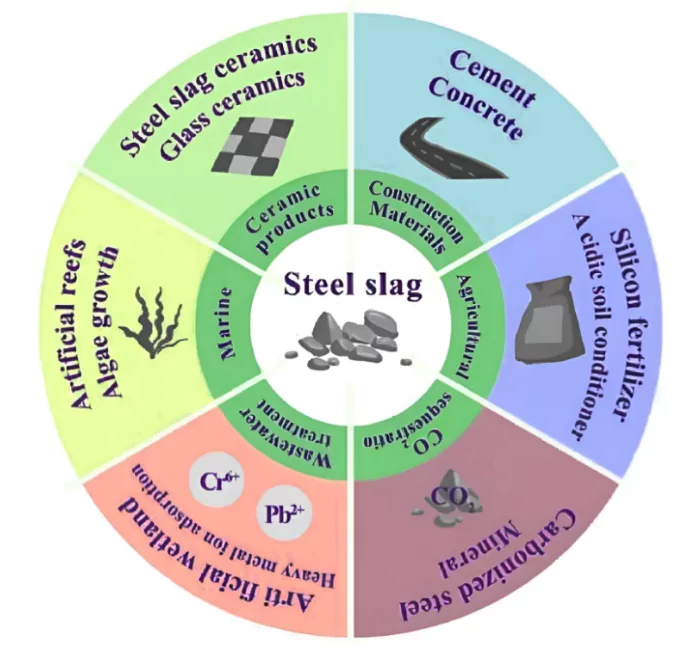First International Conference on Steel Slag Road jointly organized by CSIR-CRRI (Central Road Research Institute) and PHDCCI( PHD Chamber of Commerce and Industry) at New-Delhi,
- It released the Guidelines for Utilization and Processing of Steel Slag as Processed Steel Slag Aggregates in Road Construction.
Steel Slag
Steel Slag is a by-product of steel making, produced during the separation of the molten steel from impurities in steel-making furnaces.
- The slag occurs as a molten liquid melt and is a complex solution of silicates and oxides that solidifies upon cooling.
- Uses of Steel Slag: It is used as an aggregate and is considered a standard practice with applications that include its use in granular base, embankments, engineered fill, highway shoulders, and hot mix asphalt pavement.
- Steel slag can be used in the agricultural sector: It has the ability to correct soil acidity.
- In fact, developed countries like Japan, the USA have taken the lead in making fertilisers using steel-making slag.

Steel Slag Road Technology
The Steel Slag Road Technology has been developed by the Central Road Research Institute under a research project in collaboration with the Ministry of Steel, Government of India and four major steel manufacturing companies of the country
Enroll now for UPSC Online Course
- Advantages:
- Eco-friendly waste management:
- Utilises steel slag waste in road construction, providing an environmentally friendly solution.
- Reduces landfill burden and environmental impact from steel slag disposal.
What is Waste to Wealth?
- It seeks to convert wastes from environmental and economic liabilities to valuable resources that create livable jobs and provide community development opportunities.
- It includes take-back, recycling and final disposal at the end of their useful life, in a way promoting circular economy.
|
-
- Cost-effective and long-lasting:
- Steel slag roads are approximately 30 per cent cheaper to construct than traditional paving methods.
- These roads are highly durable and weather-resistant, leading to significantly lower maintenance costs.
- Minimising natural resource depletion:
- Reduces the reliance on natural ballast and aggregates, conserving valuable resources.
- Helps preserve natural ecosystems by eliminating the need for traditional road construction materials.
- Managing steel slag waste:
- India produces around 19 million tonnes of steel slag annually, expected to reach 60 million tonnes by 2030.
- Inefficient disposal methods have led to large slag piles around steel plants, causing pollution.
- Challenging terrain success: Border Roads Organisation (BRO), in collaboration with CRRI and Tata Steel, constructed a steel slag road in Arunachal Pradesh, showcasing the technology’s suitability for difficult terrains and essential infrastructure.
- “Waste to Wealth”: This technology is making significant contributions to realize the vision of “Waste to Wealth”.
Check Out UPSC CSE Books From PW Store
![]() 5 Jul 2024
5 Jul 2024
